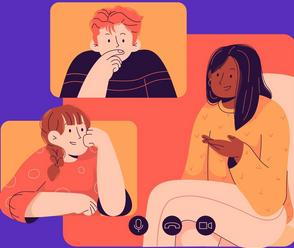
We all have trouble with communication at times in our lives. Whether it's trying to tell someone something that may be hard for us to say or hard for them to hear or trying to get someone else to tell you something that may be bothering them. When these communication problems arise in our daily lives, the concepts of active and supportive listening can go a long way.
Communication may seem like it would be human nature and come naturally to each person, and while some of that may be true, as I have learned in life there are many things that factor into "good" communication and "good" relationships. Before we are even born into this world while we are still developing in our mother's bodies, we can hear- so that by the time we are actually born, we have been listening and hearing things around us for five months (Buckley & Barrow, 2003). We learn patterns of communication and expressing or not-expressing emotions in situations from the time we are children. All these experiences have to do with communication and affect the way that we do and do not communicate as we grow and get older.
If you want to improve the way you communicate with others and improve how others communicate with you, you can learn how to become supportive and active listener. Learning to be a supportive listener goes right along with having and developing compassion for one another. The research literature says that compassion is a "virtuous response that seeks to address the suffering and needs of a person through relational understanding and action". (Brown, 2021, p.118) Brene Brown notes that "Compassion is fueled by the understanding and accepting that we're all made of strength and struggle - no one is immune to pain or suffering." Compassion is not a practice of "better than" or "I can fix you" - It's a practice based in the beauty and pain of shared humanity". I recently heard the definition of compassion described as including these three things: First, NOTICE what is going on for the person. Second, FEEL for the person and what is going on for them. Last, is to DO something to help relieve the persons struggling. That may be as simple as providing a listening ear for them and being willing to sit in the discomfort with them while they express their feelings. As we become better supportive listeners, we become more compassionate to everyone around us and the world becomes a better place.
Brown, B (2021) Atlas of the heart: Mapping a meaningful connection and the language of human experience. Random House Publishing.
Buckley, B., Buckley, B. (2003) Children' s Communication Skills: From Birth to Five Years. Florence, US: Routledge.
